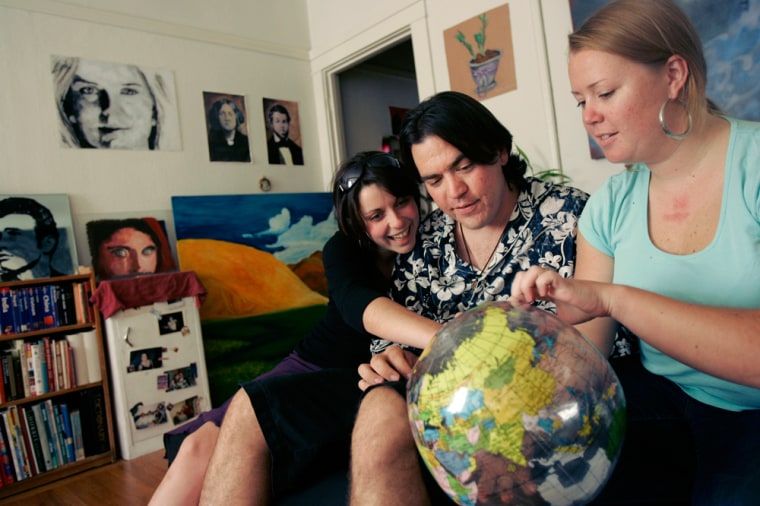Jim Stone, a 29-year-old from west Texas, has been traveling nonstop since March of 2004.
Sometimes in a pickup truck and other times on a motorcycle, he's trekked through much of the United States, Australia, New Zealand and Europe. But he's slept in a hotel just one night over that stretch of nearly 1,000.
That's because Stone is part of a growing network of people online who've gone a step beyond hotels, hostels and even apartment swapping in their travel planning: They sleep on each others' couches.
A number of Web sites have sprung up to help pair travelers searching for a place to crash and hosts with a spare couch. Sites like hospitalityclub.org, couchsurfing.com, globalfreeloaders.com and place2stay.net are often free, serving only as middlemen and offering tips on how to find successful matches.
The sites aren't moneymakers. They're largely the creations of 20-somethings bitten with wanderlust and the hope to help bridge together people from different cultures. They often depend on volunteer administrators to help manage the Web operations.
Among the biggest is hospitalityclub.org, a site founded in 2000 by Veit Kuehne, who was then a 22-year-old business student. Kuehne wanted to use the Internet's reach to help foster the ideas of a group called Servas, an international peace organization that encourages cultural exchanges through travel.
The site grew to 1,300 members by 2002, 100,000 members by January 2006 and 200,000 by September.
From his home in Dusseldorf, Germany, Kuehne said hospitalityclub.org funds itself through online advertisements, which pitch student-exchange programs, Thailand volunteer opportunities or cheap tickets to west Africa.
"We're not really soliciting donations yet," he said.
Kuehne said he doesn't get a salary from the site and has been depending on volunteers to help develop and operate it. Living off savings recently, he found a cheap, $200 plane ticket to India, where he plans to spend the winter working on the site and benefiting from lower living costs.
The west Texan Stone uses another site, couchsurfing.com, where membership has catapulted to above 128,700 since launching in January 2004.
Its members, like hospitalityclub.org's, stretch across the globe: Although the United States is the country with the largest number of members, making up about 25 percent of couchsurfing.com's total base, Europe overall boasts 41 percent. The average age is 25, though 43 percent of members are between 18 and 24.
Couchsurfing.com got its indirect start years ago, when New Hampshire native Casey Fenton found a cheap airplane ticket to Iceland. In the few days he had to find a place to stay, Fenton happened upon the student directory of the University of Iceland.
Fenton sent e-mails to about 1,500 students, asking for a place to crash and within 24 hours received dozens of responses. Through staying with a local, Fenton said he was able to see their Iceland rather than merely the tourist's view.
Couchsurfing.com depends largely on member donations to pay the operating bills. When it falls short, administrators send requests to members asking for more assistance. Recently, the site raised $8,000 it needed after e-mailing 6,000 members.
Aside from asking if the services are really free, one of the top questions on most of the sites' Frequently Asked Questions is some variation of: "Is this safe?"
Eric "Rico" Lesage, a 35-year-old from Montreal remembers hearing that question from his mom when he told her about couchsurfing.
"She was not all into it," said Lesage, who had his first couchsurfing experience in 1990 when a couple of guys he met on a California beach let him sleep on their couch. "But she's not a tut-tutter; I'm responsible."
Sites do offer some safeguards to help members: Members can vouch for each other and leave references for someone they've stayed with or hosted, similar to eBay's rating system.
But Web sites warn that they are not liable for any possible dangers that could arise between host and traveler.
"We are not responsible for the outcome of host/surfer negotiations," couchsurfing.com's Fenton said. "We can't guarantee what will happen. We'll do as much as we can to provide data (about the person), but beyond that, that's all we can do."
Lesage, a photographer and a volunteer administrator for couchsurfing.com, said the best way to stay safe is to read closely the information available on members' profiles. He also sets a general three-day limit for how long people can crash on his couch.
Noemie Cliche, a 21-year-old geography student from Montreal, said she has had just one problem since joining couchsurfing.com in March.
"Once, I hosted a guy who was not nice and was a little weird," she said. "I just asked him to leave, and yes, he did leave."
Otherwise, Cliche said she finds couchsurfing much more enjoyable than the hostels she used to stay at while traveling.
Recently, she journeyed through California with the west Texan Stone, who has not had a permanent address since he began his walkabout in 2004.
He acknowledges he's a hard-core couchsurfer, taking on the ethos of meeting interesting people through their couches as a lifestyle. Among the more interesting couches, Stone says he slept on one aboard a 39-foot sailboat moored outside Jacksonville, Fla.
"I haven't found another lifestyle that I enjoy this much," he said.
